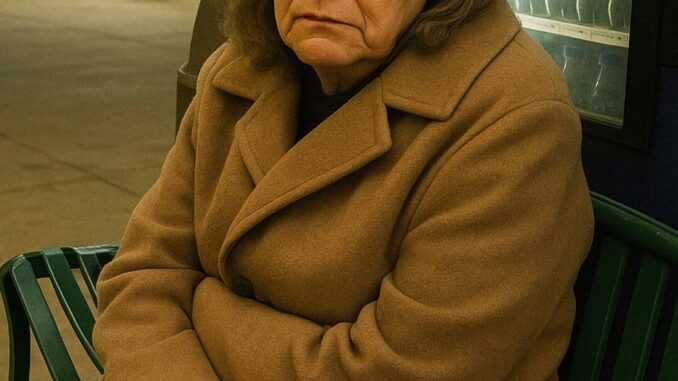
I’ve never been one to share much online, but what happened last month left a mark that I can’t ignore. I’ve always been known as the calm one—the quiet thinker, the man who solves problems without raising his voice. For 43 years, I worked at the same manufacturing plant, climbing from floor worker to supervisor. I missed holidays, weekends, and lost plenty of sleep, all to provide for my family—giving them everything they needed, though not always everything they wanted. And throughout all those years, the one person who never once let me down was my wife, Laura.
Laura, with her soft voice and gentle heart. She remembers every birthday, clips coupons we don’t even need anymore, and still volunteers at the animal shelter every Tuesday because “the cats get lonely.” After I retired, my time became hers. We finally had quiet mornings, lazy Sundays, and the kind of peace you only find when life slows down. And then our twin grandsons—Kyle and Dylan—came into the picture.
They’re 23, full of energy and charm. I thought we raised them right. But then came Easter. They showed up at our door with big smiles, announcing a surprise birthday trip for Laura—a visit to D.C. to see the cherry blossoms, something she had always dreamed of. Their excitement was contagious. They promised to take care of everything—hotels, meals, even driving her in her own car. Laura was speechless, even in tears. I was a bit misty myself. They insisted I stay behind, claiming this trip was just for her.
Two days later, I got the call.
Laura’s voice trembled. She was at a gas station—alone, cold, and stranded. No food. No money. No car. She whispered, “I didn’t want to call you, but I don’t know what to do.” They made her pay for everything—the hotel, meals, museum tickets, even new clothes they “forgot” to pack. Every time she opened her wallet, they called it temporary. On the drive home, they stopped for gas. Laura went in to pay. When she came out, they were gone. They took her car and went to a club in the next town.
She spent the night huddled by a vending machine in a thin spring jacket, too scared to sleep, praying they’d come back. But they never did. I picked her up four hours later, and during the drive, I didn’t say a word. I let her talk, I listened. By the time we pulled into our driveway, I already had a plan.
Three days later, I texted the boys. “Grandma and I were so touched by your surprise. Let us return the favor. Pack for the weekend. We’re taking you on a trip.” They responded quickly, excited and laughing. What they didn’t know was that I had already called Sam, an old friend who runs a wilderness camp deep in the mountains—a digital detox retreat. I told him everything. He said, “Say no more, Arnold. I’ve got you.”
We left on Friday morning. The boys were full of energy in the backseat, blasting music, taking selfies. They asked about the hotel. I just smiled. When we arrived, they looked around in disbelief. Dirt lot. Outhouses. Peeling cabins. No Wi-Fi. No cell signal.
“Where’s the real place?” they asked.
“This is it,” I said. “Retro weekend. Disconnect to reconnect.”
They laughed nervously. I took their phones. “It’s part of the experience.” I handed them to Sam, who was waiting, then showed them the schedule:
6 a.m. cold showers. Latrine cleaning. Firewood chopping. Dishwashing. Journaling on gratitude. Sunday? Push-mowing the field, building a compost bin, and a final lecture titled “Respecting Your Elders: Why It’s Not Optional.” Their mouths dropped. I said nothing. Just handed their bags to Sam and drove off.
That weekend, Laura and I sat at home, quiet. She wasn’t sure at first, said they were just kids. But I reminded her of how she looked at that gas station. And she said no more. Sunday night, the house phone rang. Kyle sounded like he’d been crying. Dylan begged to speak to Grandma. I handed her the phone. They apologized through tears, saying they were sorry and that they’d never forgive themselves.
Laura listened. Then she said, “I knew your grandfather would come up with something fitting. He doesn’t talk much—but he never forgets my tears.”
I picked them up the next morning. They looked older, sunburned, sore, and silent. They hugged Laura like they’d never see her again. I made pancakes, and we ate in silence. Sometimes, you don’t need to say anything. Let the guilt do the work.
A week later, they returned. Not for money. Not for favors. They brought photo albums from the trip. Real photos. Thoughtful ones. Monuments. Blossoms. Smiles. Inside was a card: “To the best Grandma. We messed up. This was supposed to be about you. Never again. Love, Kyle & Dylan.” And in the envelope: every cent she had spent, paid back in full.
Since then, they call every week. Take her out to lunch every other Sunday. Fix things around the house without being asked. They’ve changed. Because sometimes, the best lessons come without yelling. Sometimes, they come with cold showers, a broken routine, and a weekend of silence in the woods.
Sometimes, love means teaching someone just how much their actions can hurt—and how to never let it happen again.
Leave a Reply